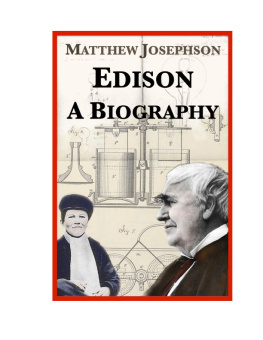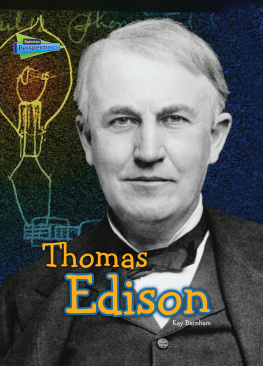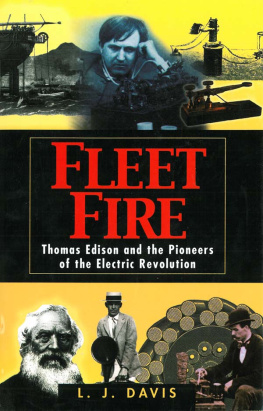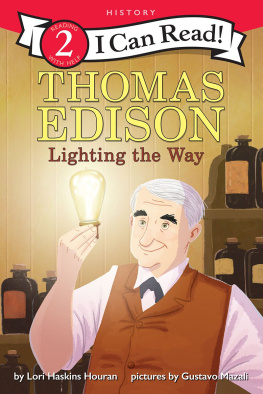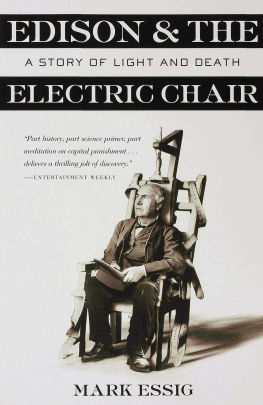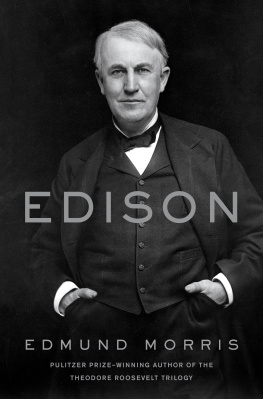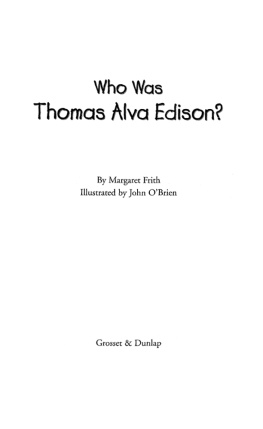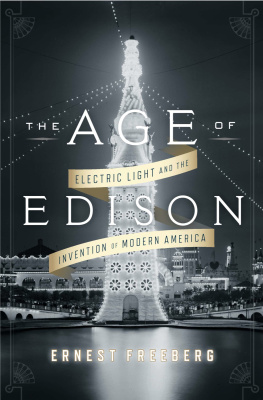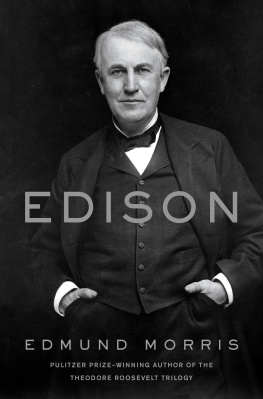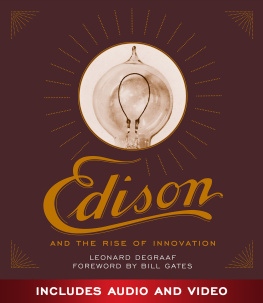Edison
A Biography
by Matthew Josephson
Published by Plunkett Lake Press , May 2018
1959 by Matthew Josephson
Cover by Susan Erony
~ Other eBooks from Plunkett Lake Press ~
By Luis W. Alvarez
Alvarez: Adventures of a Physicist
By Niels Blaedel
Harmony and Unity: The Life of Niels Bohr
By David C. Cassidy
J. Robert Oppenheimer and the American Century
By Herbert Childs
An American Genius: The Life of Ernest Orlando Lawrence, Father of the Cyclotron
By Raymond B. Fosdick
John D. Rockefeller, Jr.: A Portrait
By Otto Robert Frisch
What Little I Remember
By Alexander L. George and Juliette L. George
Woodrow Wilson and Colonel House: A Personality Study
By Samuel Goudsmit
Alsos
By Andy Grove
Swimming Across
By James Hershberg
James B. Conant: Harvard to Hiroshima and the Making of the Nuclear Age
By Banesh Hoffmann
Albert Einstein: Creator and Rebel
By Norman Macrae
John von Neumann: The Scientific Genius Who Pioneered the Modern Computer, Game Theory, Nuclear Deterrence, and Much More
By Alpheus Thomas Mason
Brandeis: A Free Man s Life
By Kurt Mendelssohn
The World of Walther Nernst: The Rise and Fall of German Science 1864-1941
By Steven Neuse
David E. Lilienthal: The Journey of an American Liberal
By Sheldon Novick
Honorable Justice: The Life of Oliver Wendell Holmes
By Susan Quinn
Marie Curie: A Life
By Patricia Rife
Lise Meitner and the Dawn of the Nuclear Age
By John Rigden
Rabi: Scientist and Citizen
By Claudio Segr
Atoms, Bombs and Eskimo Kisses: A Memoir of Father and Son
By Emilio Segr
A Mind Always in Motion : The Autobiography of Emilio Segr
Enrico Fermi, Physicist
By Dietrich Stoltzenberg
Fritz Haber: Chemist, Nobel Laureate, German, Jew
By Victor Weisskopf
The Joy of Insight: Passions of a Physicist
By Richard Willst tter
From My Life: The Memoirs of Richard Willst tter
By Stefan Zweig
Magellan: Conqueror of the Seas
For more information, visit www.plunkettlakepress.com
Contents
Introduction and Acknowledgments
In Thomas Alva Edison we have a rough-hewn, old-fashioned American individualist who has been generally recognized as one of the most prolific inventors known to history. The story of his life, filled with human and scientific adventures, and the account of his many and varied works, takes us back to the heroic age of invention, as the last third of the nineteenth century has been called. It was in its own way a climactic period in the mechanical arts, when America was esteemed as one of the most inventive of nations, and Edison served as a central figure in the technological revolution of his time.
Today we are more than ever concerned with inventors, and with our hopes (or fears) for what they may bring forth. There has been much change, yet it is doubtful that the human element has changed greatly. Edison still has a good deal to tell us. A sort of latter-day Prometheus, he dramatized the life and labor of scientific invention as perhaps no other of his kind had done. One feels that it was with a good instinct that our people made the former trainboy one of the greatest of their folk heroes; to them he was the man who was forever making things. He was above all creative, hence one of the real builders of America. During a long era when America seemed dominated by men who were great acquisitors, Edison typified the Spirit of Workmanship.
It is curious that, for almost a quarter of a century, very little that is informative has been written about him. While he lived, and during the first years after his death, hundreds of books and thousands of articles about him, in all languages, appeared. The most useful of these works was undoubtedly the authorized biography by Dyer, Martin and Meadowcroft, published originally in 1910 and reissued in a revised edition in 1929; it contained some of Edison s autobiographical notes and his own accounts of his principal inventions. Since this book was published, however, much new knowledge and an immense amount of documentary material has accumulated, making necessary extensive revisions of earlier accounts of the inventor and key episodes in his life. Though one may feel strongly attracted by the rich, human qualities of Edison, one sees no useful purpose in preserving various inaccurate stories and false legends, repeated in one book after another, which obviously demand revaluation in realistic terms. Removing the veils of myth, however, leaves Edison s true stature undiminished. Even his mistakes, it has been observed, were carried out in a big way and make him appear more inspiring to us than if he were regarded, as his hagiographers used to picture him, as an infallible one.
Many misconceptions about Edison, on the other hand, still prevail among contemporary students of science, perhaps reflecting a reaction against the hero worship of yesterday. Some of the new scientists tend to depreciate him as one of the breed of pioneering inventors of the last century who had little scientific training and depended largely on cut-and-try methods. But though he liked to pretend that he was only a practical inventor, and to make jests at the expense of the men of pure theory, he worked closely with some of the leading university physicists of America and England, several of whom were constantly employed in his laboratory. The full records of his research show us that he had a wide understanding of the principles of science as known in his time and tremendous faith in the method of scientific experimentation. He was self-taught; but so were some of his most famous predecessors, such as Davy and Faraday.
A just view of Edison s historic role, suggested recently by Norbert Wiener, would be that he was a transitional figure in late-nineteenth-century science, arriving on the scene at the period when the crude mechanical inventors had done their part, and systematic experiment and research was henceforth to be undertaken by skilled and specialized men, on a much larger scale than before. It was, after all, the young Edison who established the world s first industrial research laboratory in 1876, at Menlo Park, New Jersey in itself one of his greatest inventions.
Today giant research laboratories, owned by private corporations or by government, stand everywhere as monuments to Edison s innovative spirit. The technicians working in those institutions have been telling us for some time now that the day of the lone inventor, in an attic or small laboratory, has passed forever. Inventions, we have been assured, are henceforth to be produced by scientific teams using more complex instruments than Edison ever knew, and made to order.
But can we ever dispense with the individual inventor, who is both dreamer and man of action? Good inventions are still not predictable. Of late, serious doubts have been expressed that the mile-long laboratories and the teams of experts are any guarantee of original achievement. Technical men themselves voice fears that the new conditions of mass research may be less than helpful to independent or nonconformist thought; and that the bureaucratic inventors of today may be losing something of the intuitive skills and the sense of simple things that an Edison possessed. As H. S. Hatfield has written, he had always his wonderful power of going straight to the practical end, never equaled since Leonardo da Vinci. The very simplicity of his devices is a mark of his greatness. Such art may not be duplicated by the mass production, in our schools, of men of scientific training. In view of the trend of modern scientific work, Edison may remain what he has been often called, one of the last great heroes of invention.
Next page
